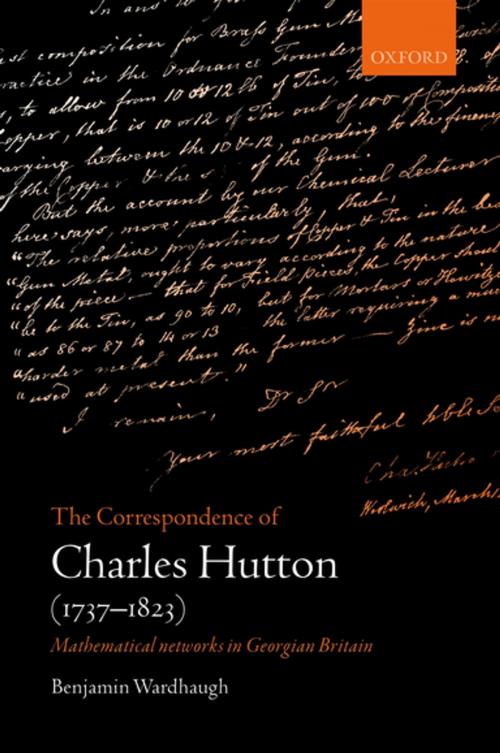The Correspondence of Charles Hutton
Mathematical Networks in Georgian Britain
Nonfiction, Science & Nature, Mathematics, History| Author: | Benjamin Wardhaugh | ISBN: | 9780192527233 |
| Publisher: | OUP Oxford | Publication: | December 8, 2017 |
| Imprint: | OUP Oxford | Language: | English |
| Author: | Benjamin Wardhaugh |
| ISBN: | 9780192527233 |
| Publisher: | OUP Oxford |
| Publication: | December 8, 2017 |
| Imprint: | OUP Oxford |
| Language: | English |
This book contains all the letters that are known to survive from the correspondence of Charles Hutton (1737-1823). Hutton was one of the most prominent British mathematicians of his generation; he played roles at the Royal Society, the Royal Military Academy, the Board of Longitude, the 'philomath' network and elsewhere. He worked on the explosive force of gunpowder and the mean density of the earth, wining the Royal Society's Copley medal in 1778; he was also at the focus of a celebrated row at the Royal Society in 1784 over the place of mathematics there. He is of particular historical interest because of the variety of roles he played in British mathematics, the dexterity with which he navigated, exploited and shaped personal and professional networks in mathematics and science, and the length and visibility of his career. Hutton corresponded nationally and internationally, and his correspondence illustrates the overlapping, the intersection and interaction of the different networks in which Hutton moved. It therefore provides new information about how Georgian mathematics was structured socially, and how mathematical careers worked in that period. It provides a rare and valuable view of a mathematical culture that would substantially cease to exist when British mathematics embraced continental methods from the early ninetheenth century onwards. Over 130 letters survive, from 1770 to 1822, but they are widely scattered (in nearly thirty different archives) and have not been catalogued or edited before. This edition situates the correspondence with an introduction and explanatory notes.
This book contains all the letters that are known to survive from the correspondence of Charles Hutton (1737-1823). Hutton was one of the most prominent British mathematicians of his generation; he played roles at the Royal Society, the Royal Military Academy, the Board of Longitude, the 'philomath' network and elsewhere. He worked on the explosive force of gunpowder and the mean density of the earth, wining the Royal Society's Copley medal in 1778; he was also at the focus of a celebrated row at the Royal Society in 1784 over the place of mathematics there. He is of particular historical interest because of the variety of roles he played in British mathematics, the dexterity with which he navigated, exploited and shaped personal and professional networks in mathematics and science, and the length and visibility of his career. Hutton corresponded nationally and internationally, and his correspondence illustrates the overlapping, the intersection and interaction of the different networks in which Hutton moved. It therefore provides new information about how Georgian mathematics was structured socially, and how mathematical careers worked in that period. It provides a rare and valuable view of a mathematical culture that would substantially cease to exist when British mathematics embraced continental methods from the early ninetheenth century onwards. Over 130 letters survive, from 1770 to 1822, but they are widely scattered (in nearly thirty different archives) and have not been catalogued or edited before. This edition situates the correspondence with an introduction and explanatory notes.















